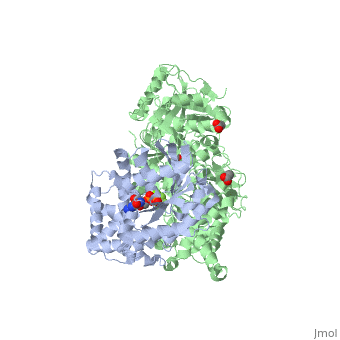We apologize for Proteopedia being slow to respond. For the past two years, a new implementation of Proteopedia has been being built. Soon, it will replace this 18-year old system. All existing content will be moved to the new system at a date that will be announced here.
PLC beta 3 Gq
From Proteopedia
(Difference between revisions)
| Line 3: | Line 3: | ||
== Introduction == | == Introduction == | ||
| - | Phospholipase C beta 3 ([http://en.wikipedia.org/wiki/PLCB3 PLC-β3]) catalyzes the hydrolysis of phosphatidylinositol 4,5 bisphosphate ([http://en.wikipedia.org/wiki/Phosphatidylinositol_4,5-bisphosphate PIP2]) to the second messengers inositol 1,4,5-trisphosphate ([http://en.wikipedia.org/wiki/Inositol_trisphosphate IP3]) and diacylglycerol ([http://en.wikipedia.org/wiki/Diglyceride DAG]) in an essential step for many physiological cascades. When the receptor | + | Phospholipase C beta 3 ([http://en.wikipedia.org/wiki/PLCB3 PLC-β3]) catalyzes the hydrolysis of phosphatidylinositol 4,5 bisphosphate ([http://en.wikipedia.org/wiki/Phosphatidylinositol_4,5-bisphosphate PIP2]) to the second messengers inositol 1,4,5-trisphosphate ([http://en.wikipedia.org/wiki/Inositol_trisphosphate IP3]) and diacylglycerol ([http://en.wikipedia.org/wiki/Diglyceride DAG]) in an essential step for many physiological cascades. When the receptor stimulated by ligand of some kind, it increases exchange of guanosine diphosphate (GDP) to guanosine triphosphate (GTP) on [http://en.wikipedia.org/wiki/Gq_alpha_subunit Gαq]. GTP-bound Gαq activates PLC-β3, and PLC-β3 increases up to three orders of magnitude the rate of hydrolysis of GTP by its activating G protein. This is a unique mechanism in which PLC-β3 enzyme has the ability to terminate the Gαq protein signal, in addition to being activated by it.<ref>PMID:20966218</ref> <ref>PMID:23880553</ref> |
== Structural highlights == | == Structural highlights == | ||
Revision as of 12:16, 17 August 2015
Unique bidirectional interactions of Phospholipase C beta 3 with G alpha Q
| |||||||||||
References
- ↑ Waldo GL, Ricks TK, Hicks SN, Cheever ML, Kawano T, Tsuboi K, Wang X, Montell C, Kozasa T, Sondek J, Harden TK. Kinetic Scaffolding Mediated by a Phospholipase C-{beta} and Gq Signaling Complex. Science. 2010 Nov 12;330(6006):974-80. Epub 2010 Oct 21. PMID:20966218 doi:10.1126/science.1193438
- ↑ Lyon AM, Tesmer JJ. Structural insights into phospholipase C-beta function. Mol Pharmacol. 2013 Oct;84(4):488-500. doi: 10.1124/mol.113.087403. Epub 2013 Jul, 23. PMID:23880553 doi:http://dx.doi.org/10.1124/mol.113.087403
- ↑ Waldo GL, Ricks TK, Hicks SN, Cheever ML, Kawano T, Tsuboi K, Wang X, Montell C, Kozasa T, Sondek J, Harden TK. Kinetic Scaffolding Mediated by a Phospholipase C-{beta} and Gq Signaling Complex. Science. 2010 Nov 12;330(6006):974-80. Epub 2010 Oct 21. PMID:20966218 doi:10.1126/science.1193438

